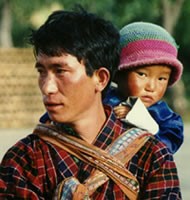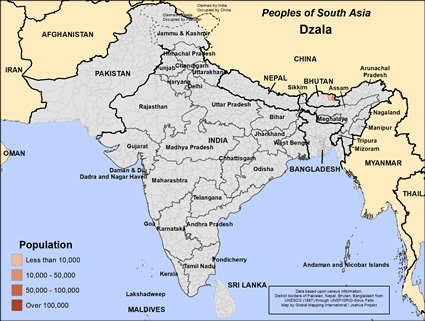The Dzala inhabit the highlands along the upper course of the Kholongchu River in the Yangtse District. In 1995, Yangtse was granted administrative status as a fully-fledged district of Bhutan. It was previously a sub-district of Trashigang, and it is often referred to as Trashi-Yangtse.
The Dzala language is also spoken as far west as the Kurichu River in Lhuntse District. The speakers of Dzala in Lhuntse, however, refer to themselves as the Khoma, and to their language as Khomakha. Khomakha has been listed as a dialect of Dzala. 'The villages on the southern slopes overlooking the Khomachu River are also Khomakha speaking.
The part of Bhutan inhabited by the Dzala is extremely poor. Many visitors say it is like stepping back to medieval times. Life is simple and slow-paced. One tourist publication unflatteringly describes the main town of Trashi Yangtse: 'It takes 10 minutes to visit the entire town.... Just north of the chorten is a bazaar area with a few shops. A tall, elaborately decorated Bhutanese-style chorten sits beside a small stream, spanned by a concrete bridge, and doubles as the town's vegetable market. A few eating and drinking shops and a spartan guesthouse mark the end of the town.
Tibetan Buddhism has been the spiritual stronghold over the Dzala people for more than 1,300 years. Buddhism entered Bhutan from Tibet, and visits from lamas and monks from Tibet, India and Nepal maintained and strengthened Buddhism here over the centuries. The Dzala people see their identity and culture as completely intertwined with Buddhism.
Someone would need to go to them with oral materials. There are a few, but enough to get the basic gospel message to the Dzala people.
Pray for loving and dedicated workers to go to the Dzala people until they have strong Christian believers among them.
Pray for them to have the spiritual hunger to seek and find the only savior.
Pray for a soon coming movement to Christ among the Dzala people of Bhutan.
Scripture Prayers for the Dzala in Bhutan.
| Profile Source: Joshua Project |











